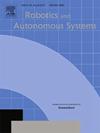仓库环境中基于学习的多智能体寻径算法的实证评估
IF 5.2
2区 计算机科学
Q1 AUTOMATION & CONTROL SYSTEMS
引用次数: 0
摘要
近年来,多智能体寻径(Multi-Agent Path Finding, MAPF)已成为自主机器人和人工智能领域中最具挑战性和最有趣的研究领域之一。MAPF包括为一组在共享环境中从初始位置移动到目标位置的代理计算无冲突路径。许多算法都是用传统的搜索和规划方法来解决这个问题的。其中一些算法缺乏数百或数千个代理的可扩展性,这促使社区最近开始研究在MAPF中使用多代理强化学习(MARL)技术。尽管需要大量的训练,但由于分散的执行,这些基于学习的方法有望在复杂环境中比传统的搜索和规划算法具有更好的扩展性。在本文中,我们对基于学习的MAPF算法的代表性样本进行了实证评估和比较,突出了它们的优缺点,并将它们与传统的搜索和规划算法进行了比较。有趣的是,虽然基于学习的算法通常在随机生成的环境中训练和测试,但我们在仓库环境中测试它们,以评估它们在现实MAPF设置中的实际适用性。我们的研究结果表明,一些基于学习的算法在路径质量方面几乎与搜索和规划算法的性能相匹配,并且显示出有限的计算工作量,证明了它们作为实际应用的可行选择的潜力。本文章由计算机程序翻译,如有差异,请以英文原文为准。
An empirical evaluation of learning-based multi-agent path finding algorithms in warehouse environments
In recent years, Multi-Agent Path Finding (MAPF) has become one of the most challenging and interesting fields in autonomous robotics and artificial intelligence. MAPF consists in computing collision-free paths for a group of agents that move from their initial locations to their goal locations in a shared environment. Many algorithms have been proposed to solve this problem using traditional search and planning approaches. The scarce scalability to hundreds or thousands of agents of some of these algorithms has recently pushed the community to investigate the use of Multi-Agent Reinforcement Learning (MARL) techniques for MAPF. Despite requiring extensive training, these learning-based approaches promise to scale better than traditional search and planning algorithms in complex environments, thanks to their decentralized execution. In this paper, we empirically evaluate and compare a representative sample of learning-based algorithms for MAPF, highlighting their strengths and weaknesses, also comparing them with traditional search and planning algorithms. Interestingly, while learning-based algorithms are usually trained and tested in randomly-generated environments, we test them in warehouse environments, to evaluate their practical applicability in realistic MAPF settings. Our results show that some learning-based algorithms nearly match the performance of search and planning algorithms in terms of path quality and show limited computing effort, proving their potential as a viable option for practical applications.
求助全文
通过发布文献求助,成功后即可免费获取论文全文。
去求助
来源期刊

Robotics and Autonomous Systems
工程技术-机器人学
CiteScore
9.00
自引率
7.00%
发文量
164
审稿时长
4.5 months
期刊介绍:
Robotics and Autonomous Systems will carry articles describing fundamental developments in the field of robotics, with special emphasis on autonomous systems. An important goal of this journal is to extend the state of the art in both symbolic and sensory based robot control and learning in the context of autonomous systems.
Robotics and Autonomous Systems will carry articles on the theoretical, computational and experimental aspects of autonomous systems, or modules of such systems.
 求助内容:
求助内容: 应助结果提醒方式:
应助结果提醒方式:


